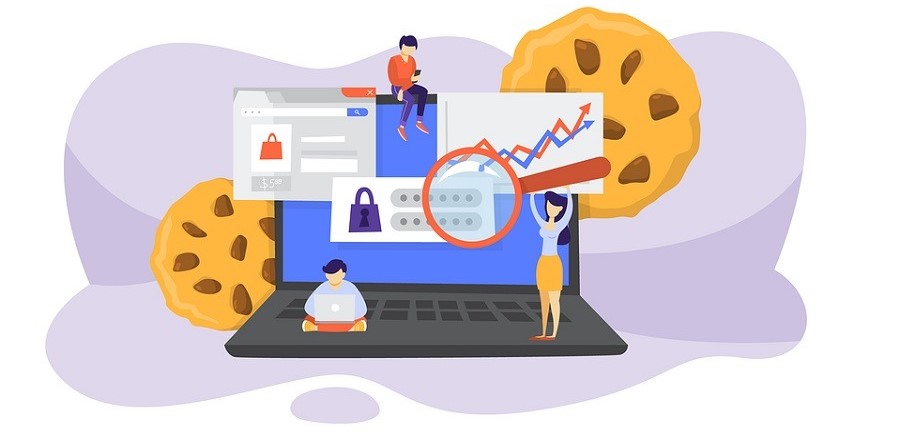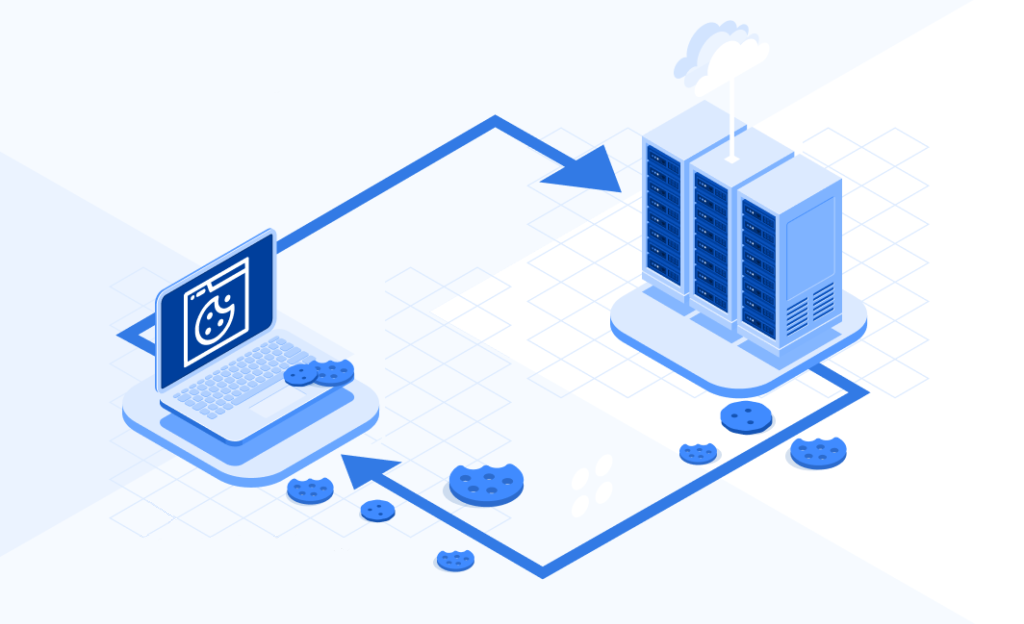
Inglese:
Cookies
Technology is everywhere. It’s taking over every aspect of our daily routine. School, work and leisure time, they’re all over our faces. People’s imagination of the future with tech is happening now. Helping us be more efficient and faster. But, what they didn’t expect from this innovation was probably one of the most controversial topics today. Called in a delicious but a mysterious single word, cookies.
Why did I mention ‘mysterious’? Well, everyone who accesses the web will be familiar with it but, they don’t really understand its concept. Every page, every article, there are pop ups of cookie agreements. According to E. Panto in his paper ‘Tracciamento e profilazione in rete’, cookies are the most used tracking tool. We often ‘accept all’ the terms without thinking twice. Once done, you’re giving third party companies the right to use your personal data online for their own benefits.

How do they work?
Let’s take for example opening a website.
- A user clicks on a link to a website: The user's browser sends an HTTP request to the web server to request a web page and the web server sends an HTTP response, including the web page, back to the user's browser.
- The web server sets the cookie: If the website needs to store information about the user's session, it sends a Set-Cookie header in the response. This header includes the name, value, and expiration time of the cookie, as well as other information such as the cookie's domain and path.
- The browser stores the cookie: The user's browser stores the cookie on the user's device, using the information in the Set-Cookie header. Browsers provide APIs (Application programming interface) for managing cookies, such as setting, getting, and deleting cookies.
- The user makes following requests: When the user makes more requests to the same website, the browser includes the cookie in the HTTP request. This allows the web server to access the stored information and continue the session.
- The web server gets the cookie: The web server retrieves the cookie from the HTTP request, using scripting languages, such as PHP, Python, or Ruby, or by accessing a database.
Through this, cookies could save the user’s actions, time spent on the site, different behaviors while browsing, emails, addresses, GPS coordinates and demographic information such as age, gender and occupation. All this data, possibly accessed by third-party companies for their own gain. Paired with AI algorithms, businesses can accurately identify which products and articles to recommend.
Customized content, though effective, can invade our online privacy. And with the damage of this privacy, it can cause identity theft, wrongful enforcing of opinions and even the suppression of freedom of speech.
One way we can avoid profile tracking is finding that ‘reject cookies’ and using a more privacy-centered search engine. DuckDuckGo is a good alternative to Google search. It’s another search engine that offers web tracking protection, better encryption and email protection. Features that Google search is not so focused at, especially if it lowers their ad monetizations. Additionally, DuckDuckGo doesn’t store search history and IP addresses. It is a good way to be a step further towards having control over your personal data, whether it be in real life or on the web.
Italiano:
I cookie
La tecnologia è ovunque. Sta prendendo il sopravvento su ogni aspetto della nostra vita quotidiana. Scuola, lavoro e tempo libero. L'immaginazione di un futuro dove la tecnologia e le persone convivono insieme sta accadendo ora. Aiutandoci ad essere più efficienti e veloci. Ma ciò che non si aspettavano da questa innovazione è stato probabilmente uno degli argomenti più controversi al giorno d’oggi. Chiamato in una sola parola deliziosa ma misteriosa, cookies (tradotto letteralmente in italiano, biscotti).
Perché ho usato "misteriosa"? Bene, tutti coloro che accedono al web li conosceranno ma non ne capiscono davvero il concetto. Ogni pagina, ogni articolo, contiene un popup con accordi sui cookie. Secondo E. Panto nel suo articolo “Tracciamento e profilazione in rete”, i cookie sono lo strumento di tracciamento più utilizzato. Spesso "accettiamo tutti" i termini senza pensarci due volte. Una volta fatto, diamo a società terze il diritto di utilizzare i nostri dati personali a loro vantaggio.
Come funzionano i cookie?
Prendiamo ad esempio l'apertura di un sito web.
- Un utente fa click su un link ad un sito Web: il browser invia una richiesta HTTP al server per richiedere una pagina Web e il server invia una risposta HTTP, includendo la pagina Web, al browser dell'utente.
- Il server Web imposta il cookie: se il sito Web deve memorizzare informazioni sulla sessione dell'utente, invia un'intestazione Set-Cookie nella risposta. Questa intestazione include il nome, il valore e l'ora di scadenza del cookie, nonché altre informazioni come il dominio e il percorso del cookie.
- Il browser memorizza il cookie: il browser dell'utente memorizza il cookie sul dispositivo dell'utente, utilizzando le informazioni nell'intestazione Set-Cookie. I browser forniscono API (interfaccia di programmazione dell'applicazione) per la gestione dei cookie, come l'impostazione, il recupero e l'eliminazione dei cookie.
- L'utente effettua le seguenti richieste: Quando l'utente effettua più richieste allo stesso sito web, il browser include il cookie nella richiesta HTTP. Ciò consente al server web di accedere alle informazioni memorizzate e continuare la sessione.
- Il server Web riceve il cookie: il server Web recupera il cookie dalla richiesta HTTP, utilizzando linguaggi di scripting, come PHP, Python o Ruby o accedendo a un database.
In questo modo i cookie potrebbero salvare le azioni dell'utente, il tempo trascorso sul sito, diversi comportamenti durante la navigazione, email, indirizzi, coordinate GPS e informazioni demografiche come età, sesso e occupazione. Tutti questi dati, eventualmente accessibili da società terze per il proprio tornaconto. Insieme agli algoritmi di intelligenza artificiale, le aziende possono identificare con precisione quali prodotti e articoli consigliare all’utente.
I contenuti personalizzati, sebbene efficaci, possono invadere la nostra privacy online. Ciò può causare furto di identità, applicazione illecita di opinioni e persino la soppressione della libertà di parola.
Un modo per evitare il tracciamento online è scoprire la voce "rifiuta i cookie" nelle informative dei siti Web e utilizzare un motore di ricerca più incentrato sulla privacy. DuckDuckGo è una buona alternativa a Google. È un altro motore di ricerca che offre protezione dal tracciamento web, migliore crittografia e protezione della posta elettronica. Funzionalità su cui Google non è così focalizzata, soprattutto se riduce la monetizzazione degli annunci. Inoltre, DuckDuckGo non memorizza la cronologia delle ricerche e gli indirizzi IP. È un buon modo per fare un ulteriore passo avanti verso il controllo dei tuoi dati personali, sia nella vita reale che sul web.
Maggy Protasio
- Accedi per poter commentare
